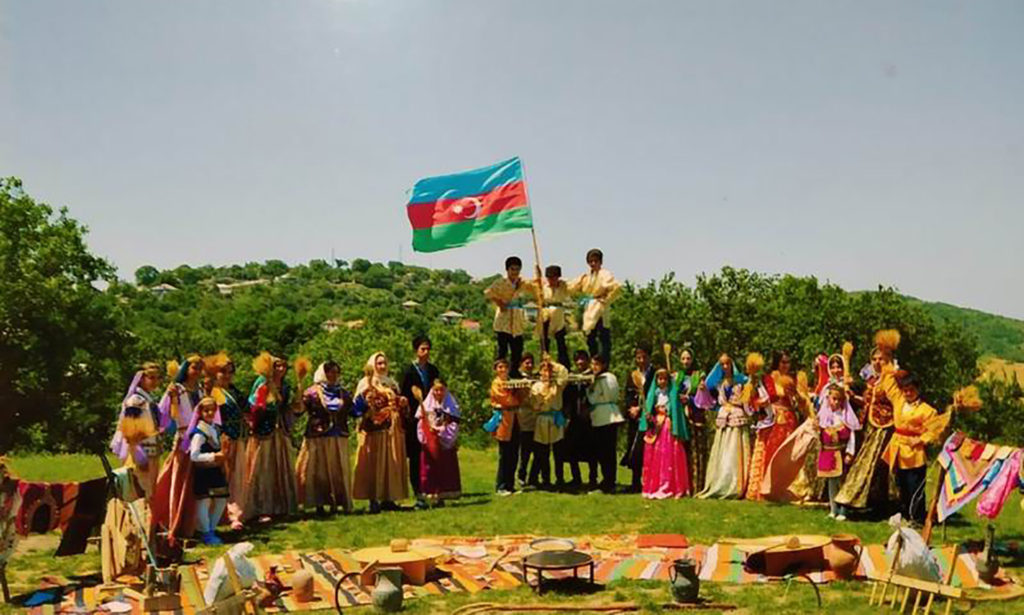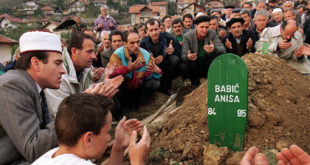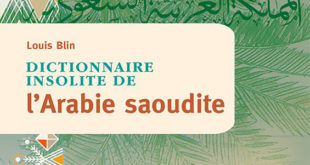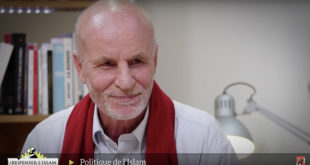By Karim Ifrak
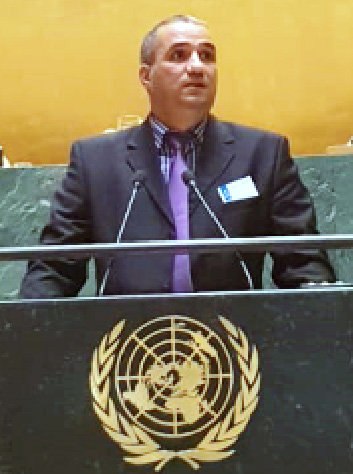
Doctor of the Practical School of Higher Studies (EPHE), Karim IFRAK is an Islamologist. A researcher at the CNRS, he is a specialist in the history of texts and contemporary ideologies. With several written contributions to his credit, he is the author of: « Should we reform Islam? Some keys to reading ”, ed. Bouraq, Paris, 2017. “Liberty, Equality, Fraternity: Spiritual Values, Republican values”, (prefaced by the Prime Minister Mr. Édouard PHILIPPE), Olivétan, Lyon, 2018. “Ibn Achour, his life, his work and his thought », Published by the IMA, 2020.
A PIONEER LAND
Established on the fringes of the three ancient empires, Russian, Ottoman and Sassanid, Azerbaijan (10 M) is one of the six former Muslim Soviet republics: Uzbekistan (32 M), Tajikistan (8.5 M), Turkmenistan (5.5 M), Kazakhstan (18.6 M) and Kyrgyzstan (6 M). Located halfway between Europe and Central Asia, this old country of the Caucasus, at the base simple port of trade and transit on the Caspian Sea, was going quickly to become, after the « industrial revolution » (XVIIIe ), the heart of intense economic activity open to the international market. A little later, carried by the revolutionary ideal of the nation-state, this « Land of fires », wishing to be resolutely progressive, advocated, after its independence (1918) freedom of conscience by instituting secularism and equality of opportunity by establishing a parliamentary system. Bluntly, Article 4 of its declaration of independence recognized: « the civil and political rights of all citizens of Azerbaijan, without distinction as to nationality, religion, social position or sex ». This recognition granted the right to vote to women very early on, making the Democratic Republic of Azerbaijan a pioneer country in this field. An event that took place long before the United Kingdom (1928), Canada (1940), France (1944), Italy (1946), Belgium (1948) Greece (1952), the USA (1965), Switzerland (1971), etc. As for the level of the Muslim world, it is undoubtedly the very first.
THE PEARL OF THE CAUCASUS
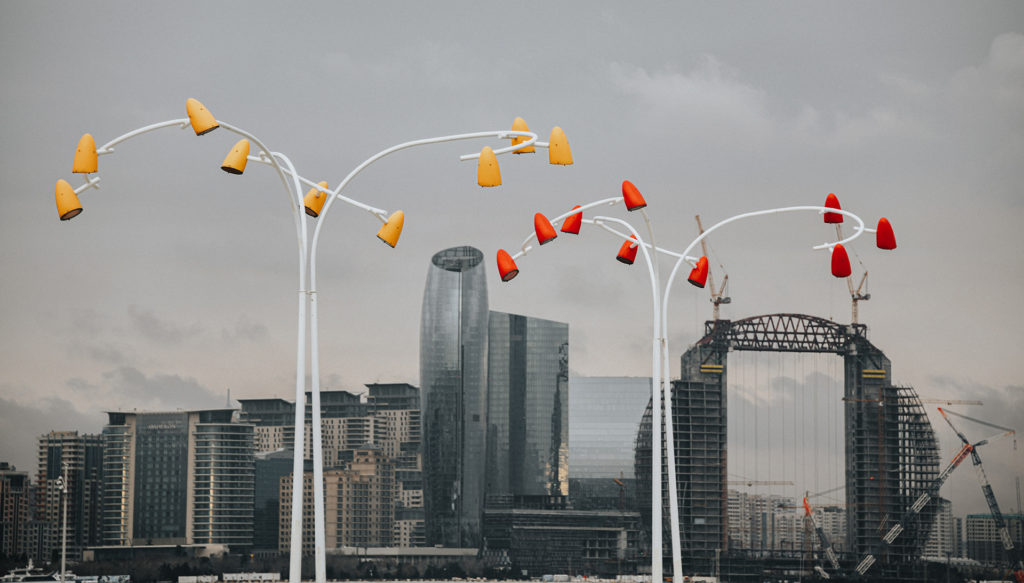
However, this first successful attempt to establish a secular and democratic regime in the Muslim world lasted only 23 months. In 1920, the country was again occupied by the Red Army; a life of isolation and suffocation that would last until the day after the breakup of the USSR on August 30, 1991. Since then, more than 166 States have established solid diplomatic relations with this Caucasian country which has in turn, more than 56 embassies open all over the world. And in this vein, Azerbaijan was the first Muslim country, and this since 1992, to maintain diplomatic relations with Israel. However, although severely handicapped by this long Soviet occupation, the country of eternal flames quickly rose from its ashes to become one of the major players in regional and global geopolitics. This is why, often compared to Qatar because of its financial windfall from the exploitation of oil fields, this « Pearl of the Caucasus » collects nicknames, that of « Emirate of the Caucasus » among others.
SECULARISM AND TOLERANCE
Nevertheless, even if the country is considered 95% Islamic, the strong attachment of its citizens to the motherland, actively participates in maintaining the sources of its national cohesion. A trend that helps to explain an extremely rare phenomenon in the Muslim world: the absence of any form of tension between its Shiite and Sunni components. A secret which lies in the fact that Azerbaijan is one of the rare Muslim countries where support for secularism is the highest and where radical ideologies, disadvantaged by a weak echo, struggle to meet the slightest little success. A multi-ethnic, multicultural and multi-confessional country, Azerbaijan, since its independence in 1991, has not ceased to maintain its centuries-old tradition of religious tolerance and to claim its unconditional attachment to secularism, inherited from the Soviet experience. In this vein, article 18 of the Constitution of Azerbaijan stipulates that religion acts separately from the affairs of state and government, thereby forming both body and spirit of so-called Azerbaijani secularism. In this way, all convictions and beliefs are considered equal before the law and therefore treated on an equal footing.
WISDOM, STRENGH AND BEAUTY
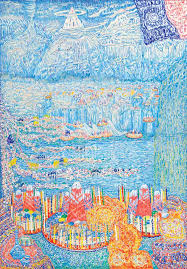
Counting among the very few of the most progressive and secular Islamic countries there is, Azerbaijan is also part of the inner circle of the first Muslim countries to have given pride of place to modernity, the arts and culture. Thus, artistically and culturally, Azerbaijan takes a great interest in these delicate muses, music and cinema in mind. A trend developed from the 1920s, making Azerbaijani cinema one of the pioneers in the world. A tradition that continues to this day, notably through the Baku International Film Festival, the largest in the whole of the Caucasus and which takes place annually during the month of September. A passion that Azerbaijan shares equally for the opera, since it was in Baku that the honor of hosting the first opera performance in the Muslim world returned. « Leyli et Medjnoun », an original work produced in 1908, under the direction of Uzeyir Hadjibeyli (1885-1945); an extraordinary artist from the city of Choucha. An exception to which is added a whole series of high-level artistic works, each as remarkable as the next. The ballet « Seven Beauties » by Gara Garayev (1918-82), performed in 1952 at the Azerbaijani State Academic Opera and Ballet Theater, which was to play a fundamental role in the development of ballet in this country and to open a new period in the life of Azerbaijani music. “The Legend of Love”, another successful ballet by Arif Melikov (1933-2019), produced from the work of Nazim Hikmet (1901-63), himself inspired by the famous Khamsa of the great poet Nizami Gandjavi (1141-1209). A work that will be performed for the first time in 1961 at the Kirov Theater in Leningrad, before treading the stage of the famous Bolshoi in 1965 and where the success was immediate, both on the scale of the USSR and within several countries. from Europe. And finally « The Thousand and One Nights » (1979), to name only this legendary ballet signed by the hand of the great composer Fikret Amirov (1922-84), inventor of the symphonic Mugham.

This double passion for arts and culture, combined with the tourist potential of this multi-ethnic country, made Azerbaijan, even in the days of the Soviet Union, one of the most visited socialist countries in terms of tourism. A trend that has not weakened so far, as it is experiencing increasingly noticeable growth. With its open-air and mountain regions and its holiday-catering villages, this “Land of Fire” welcomed, in 2019, some 3.17 million visitors from all over the world. An expansion up by more than 11% compared to 2018. And if Azerbaijan meets an increasingly strong tourist demand, it is precisely because of this that it continues to deploy considerable efforts in terms of dialogue and openness to the world. This is particularly the case with the « Baku Process », a unique event which brings together, with the objective of strengthening intercultural dialogue, the Organization of Islamic Cooperation and the member states of the Council of Europe. And as a corroboration of this international event, The World Forum on Intercultural Dialogue, scheduled every two years, has been recognized by resolutions of the United Nations General Assembly as a key global platform for the promotion of intercultural dialogue. . A fine track record that Azerbaijan is keen to build on by hosting, in particular, the 7th World Forum of the United Nations Alliance of Civilizations.
A PIONEERING NATION IN WOMEN’S RIGHTS
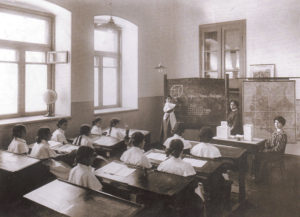
In terms of women’s rights, Azerbaijan is also a leader. The 2020 elections, which in many cases give the advantage to highly invested women, suggests that there will be more and more women in politics. A breakthrough which confirms the importance given to the education of adolescent girls (94.54% according to Unesco statistics) and which makes Azerbaijan, by extension, one of the countries where the percentage of women researchers is among the highest. high in the world (56%). Currently, the literacy rate in Azerbaijan is close to 100%. 54% of its master’s students, 51% of its doctoral students and 46% of its doctors are also women. Women who represent 59% of the total staff of the Azerbaijani National Academy of Sciences. No wonder all of this, given the history of this country in terms of human rights for women. In the spirit of this progressive state, education has always been synonymous with emancipation. This is why, at the dawn of the twentieth century already, Baku had opened, in 1901, the doors of its first secular school for girls with the support of the philanthropist Zeynalabdin Taghiyev and granted, in 1902, to The Society for the Defense of Women. ; a feminist association, the right to open one’s own.
AN ESSENTIAL PLAYER IN THE WORLD OF TOMORROW
Geostrategically, Azerbaijan, as a country rich in hydrocarbons and politically stable, meets the Brussels criteria perfectly. Thus, with the twentieth oil reserve and the twenty-fifth gas reserve worldwide, Baku, has never ceased to attract the attention of one of the largest global consumers of hydrocarbons in perpetual quest new sources of supply: the European Union. An interest that nothing will disturb, in particular since a new oil reserve (Shah Deniz) was discovered in the Caspian Sea (2006). An estimated reserve of 100 billion cubic meters of gas, intended to satisfy part of the voracious and exponential appetite for energy of the modern world.
_______________________________________________________________________
Photos credits
Maya Baghirova
Revue IRS Heritage
_______________________________________________________________________
 Musulmans en France L'actualité des musulmanes et musulmans en France
Musulmans en France L'actualité des musulmanes et musulmans en France
